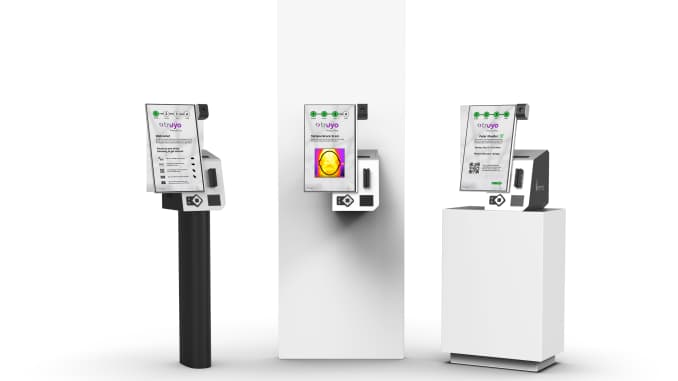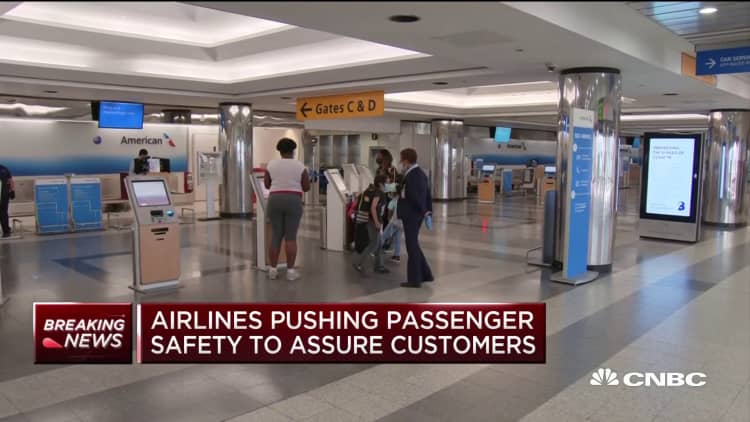This article originally appeared here.
- IntraEdge and Pyramid have created a contactless kiosk that can check the temperature of up to 1,500 people per hour.
- The kiosk utilizes Pyramid’s thermal imaging technology and has an error margin of less than one-tenth of a degree Fahrenheit.
- No data is stored on the kiosk itself. Using IntraEdge’s Truyo Privacy Rights Platform the data is immediately encrypted and transferred to Truyo’s cloud.

Janus, a temperature-reading kiosk from IntraEdge and Pyramid, can be installed freestanding, using a wall mount or on a countertop.IntraEdge
As states reopen to the public during the coronavirus pandemic, retailers, hotels, movie theaters and sports stadiums are all looking for ways to keep patrons and staff safe.
Many of these businesses have been closed since mid-March to help stop the spread of the virus, and they are eager to rehire staff and welcome back customers and the billions of dollars they bring. But these businesses want to do so safely to protect employees and encourage customers to return.
One common strategy is to implement temperature checks at the front door. While not perfect, temperature checks can weed out the most obvious of Covid-19 cases. Still, for venues that typically have large crowds, trying to do mass temperature checks can be an overwhelming undertaking. In these situations, the handheld temperature readers aren’t a perfect solution.
On Thursday, IntraEdge and Pyramid Computer said they are working with Intel on a possible solution that leverages existing screeing and privacy technology thatthe companies manfuacture.
The tech companies partnered to create Janus, a contactless kiosk that is less than two feet tall and a little over a foot wide that can check the temperature of as many as 1,500 people per hour.
This is how it could work. Say you’re attending a concert. You would open up the Janus website on your smartphone, and fill out a questionnaire specific to the venue. You might be asked to verify your identity with a two-factor authentication and step up to the machine.
After scanning the QR code on your phone, you place your head in the range of the camera and within one to five seconds the machine will send the temperature information to your mobile device. The screen on the Janus device won’t show your result, but will tell the screener if a guest has been granted access to the venue or not.
For those without a smartphone, there will be prompts on the kiosk itself to fill out. In this case, the experience will take a little longer.
“Nothing will be ‘normal’ about our ‘new normal,‘” Ryan Lagace, North American chief operating officer of Pyramid Computer, said in a statement. “But we firmly believe Janus will make a positive difference in the lives and environments of businesses’ re-opening through our contactless and secure solution.”
No data is stored on the kiosk itself. Instead it is immediately encrypted and transferred via IntraEdge’s Truyo privacy platform.
The kiosk uses Pyramid’s thermal imaging technology and has an error margin of less than one-tenth of a degree Fahrenheit, Dan Clarke, president of IntraEdge products and solutions, said.
There are limits to temperature screening. The absence of a fever doesn’t mean that a person is free of the coronavirus. People can be asymptomatic or not yet be showing symptoms of Covid-19, and still transmit the virus to others. Fever-reducing medication can also impact the results.
The director of the Centers for Disease Control and Prevention, Dr. Robert Redfield, last month said that as many as 25% of people infected with Covid-19 may not show any symptoms. Some studies have indicated that percentage could be even higher.
Automakers like Ford have implemented strict return to work protocols, including temperature screenings. However, Ford was forced to shutdown its Chicago plant twice in less than 24 hours after two workers tested positive for coronavirus and its Michigan truck plant after one employee tested positive.
Workers at both plants are being asked to self-quarantine for 14 days.
Clarke noted that temperature checks aren’t the only strategy that businesses should be employing during the coronavirus outbreak. Masks, social distancing and lowered attendance capacity are all strategies that businesses are using to promote safety during the outbreak.
“You have to take a holistic approach, but it is a key piece of the puzzle,” he said.

WATCH NOWVIDEO02:23Frontier Airlines becomes first US airline to institute temperature checks
Janus can also be used for checking employee temperatures. Staff can either use a phone log-on like customers would, or the machine can be programmed to be integrated with the company’s HR system or badge reader.
Already, there are tens of thousands of kiosks like the Janus in offices, they just aren’t deployed for temperature reading. Instead, they are used for checking employees in for their shift or as self-check in kiosks at hotels. Because of that, the turnaround time for companies to order a Janus device and receive it is around four weeks, Clarke said. Adding special features like a proprietary ID reader would add around two weeks time to delivery.
While the need for a system like Janus may be urgent during the coronavirus pandemic, it many not be needed by businesses forever, Clarke said. However, he expects these kiosks could have a secondary life and function for other purposes such as checking into a hotel, screening movie tickets or other security purposes.
Clarke said the company has already had interest from a number of hospitality, movie theater, retail, restaurant and professional sports businesses. One hospitality business, which employs around 1,500 people, is prepared to order 24 machines, he said.
A single Janus kiosk costs around $7,500, he said. It’s recommended businesses have two machines per entrance in order to expedite entry. The kiosk can be installed as a freestanding unit, on a wall mount or on a countertop.
About Ryan Foster
orem ipsum dolor sit amet, consectetur adipiscing elit. Quisque mollis leo sed urna hendrerit, non pharetra ex ullamcorper. Vivamus nec velit ligula. Suspendisse commodo odio sed quam porta, id vehicula augue elementum.
Recent Posts




























